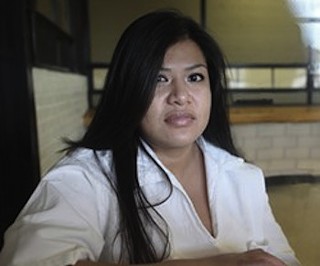Supremes Reject Jimenez Appeal
Case moves back to federal district court
By Jordan Smith, 10:41AM, Tue. Jan. 8, 2013
After some six months of consideration, the U.S. Supreme Court on Monday rejected an appeal brought on behalf of Rosa Jimenez, in prison for the choking death of a toddler left in her care.
Jimenez was convicted and sentenced to 99 years in prison for the choking death of toddler Bryan Gutierrez a decade ago. Jimenez was babysitting Gutierrez in January 2003 when prosectors say she shoved a wad of five paper towels down his throat, choking him. He died in hospice three months later. At her trial, the doctors who treated Gutierrez opined that there was no other explanation for the choking than that Jimenez had intentionally harmed the child. Their insistence carried the day until a December 2010 hearing during which a phalanx of top experts came to Austin to testify that Gutierrez's choking was more likely a tragic accident. Indeed, that was the first time that Jimenez had presented significant expert testimony in order to counter the state's case. At her original trial her appointed attorney was given resources only to hire a single experts, a doctor who had a meltdown on the stand and cursed at prosecutors in the hallway – a tongue lashing used to discredit him on the stand.
While then-Judge Charlie Baird ruled that Jimenez should be granted a new trial, the Court of Criminal Appeals subsequently rejected his findings, made from a multi-day evidentiary hearing with live witnesses in his court, and ruled instead not only that Jimenez was not entitled to as many experts as the state, but also that evidence of Jimenez's innocence was not "clear and convincing," the standard by which the CCA ruled that she should be judged.
Whether that is the proper standard for considering whether the evidence points to Jimenez's innocence was among the questions before the U.S. Supreme Court in a certiorari petition filed on Jimenez's behalf this summer. Both the Mexican government, a group of distinguished legal scholars from across the country (including UT's own Jordan Steiker), and Dallas County District Attorney Craig Watkins were among those filing briefs with the Supremes urging them to take the case. To the Dallas D.A., the case was a perfect vehicle to determine what standard should apply in determining a defendant's free-standing claim of actual innocence – that is, a where a claim of innocence stands alone, without being tied to a Constitutional claim or other procedural defect – and to decide whether a preponderance of evidence, clear and convincing evidence, or some other standard altogether should be used to evaluate such claims.
The Travis County D.A.'s office opposed the move, arguing that Jimenez's case was not (at least at present) the vehicle by which any consideration of free-standing actual innocence claims should be decided.
The Supremes rejected the case yesterday, without written order, kicking the matter back to the federal district court for further proceedings that will address the issues raised before the high court.
For more on the case, see "A Parliament of Experts," Feb. 4, 2011
Got something to say on the subject? Send a letter to the editor.
A note to readers: Bold and uncensored, The Austin Chronicle has been Austin’s independent news source for over 40 years, expressing the community’s political and environmental concerns and supporting its active cultural scene. Now more than ever, we need your support to continue supplying Austin with independent, free press. If real news is important to you, please consider making a donation of $5, $10 or whatever you can afford, to help keep our journalism on stands.
Richard Whittaker, Aug. 25, 2017
Richard Whittaker, July 7, 2016
Jordan Smith, Nov. 26, 2013
Jordan Smith, Aug. 27, 2013
May 22, 2014
Rosa Jimenez, Bryan Gutierrez, U.S. Supreme Court, courts, expert testimony, wrongful conviction, Charlie Baird, Court of Criminal Appeals, Craig Watkins, actual innocence













